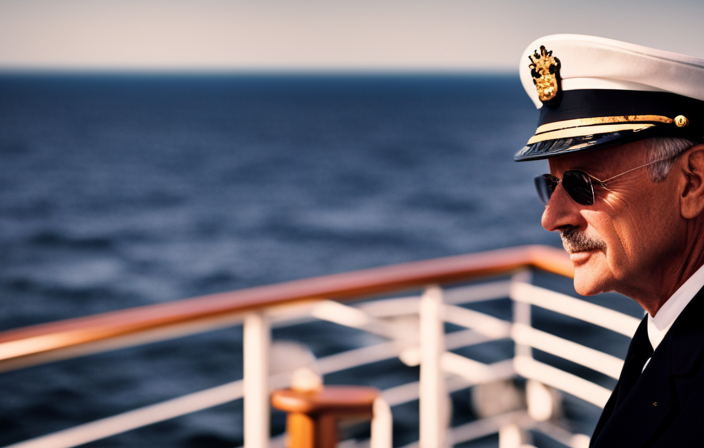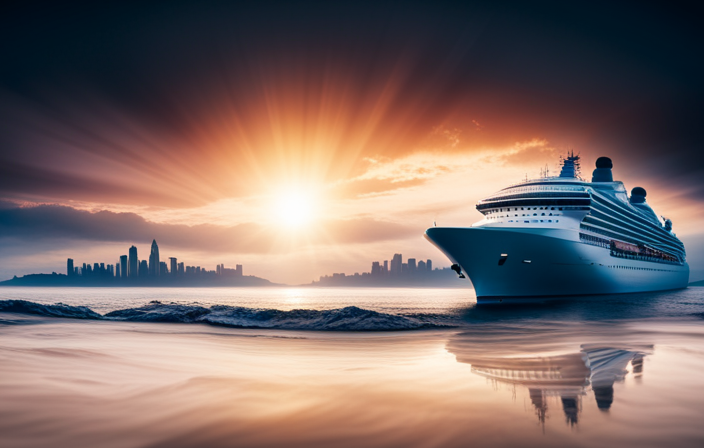I’m in command, navigating the immense vessel through the boundless expanses of the ocean. Holding the position of a cruise ship captain carries considerable responsibilities, yet the rewards are equally great. You may wonder, what is the salary of a cruise ship captain? Let me guide you through the world of these maritime leaders.
Being a cruise ship captain requires a unique blend of skills and experience. From navigating intricate routes to managing a diverse crew, the job demands both expertise and finesse. But what about the financial aspect? How much do we earn?
In this article, I will share with you the average salary of a cruise ship captain and delve into the additional income opportunities that come with the position. But it’s not just about the money. I will also explore the benefits and perks of being a captain, as well as the challenges and responsibilities that come with the role.
So, grab your life jacket and join me as we uncover the secrets of what cruise ship captains truly make.
Key Takeaways
- Cruise ship captains have a range of responsibilities including overseeing navigation, ensuring passenger safety, managing the entire crew, and possessing excellent communication skills.
- To become a cruise ship captain, individuals need to obtain a bachelor’s degree in marine transportation or a related field, obtain a captain’s license, pass rigorous examinations on navigation, safety procedures, and maritime law, and gain several years of experience on various vessels.
- Cruise ship captains earn an average salary of around $150,000 to $250,000 per year, with earnings varying based on cruise line size, reputation, experience, and responsibilities. They have higher earnings compared to captains of other vessels due to the unique challenges and responsibilities of captaining a cruise ship.
- In addition to their salary, cruise ship captains have additional income opportunities such as offering private charters or special events on the ship, giving lectures or workshops on board, and earning commissions from onboard sales, which can enhance their financial benefits and career growth prospects.
The Responsibilities of a Cruise Ship Captain
The responsibilities of a cruise ship captain include overseeing the navigation, ensuring the safety of passengers, and managing the entire crew. A good captain possesses a range of qualities that enable them to effectively lead and coordinate the ship’s operations. These qualities include excellent communication skills, the ability to make quick and sound decisions, and a strong sense of responsibility.
Additionally, a captain plays a crucial role in managing crew dynamics, fostering a positive and cohesive working environment onboard. They must be able to motivate and inspire their crew members, ensuring that everyone is working together towards a common goal. The captain’s role in managing crew dynamics is essential for maintaining a smooth and efficient operation onboard the ship.
Moving on to the qualifications and training required to become a captain, it is important to understand the extensive knowledge and experience necessary to excel in this position.
The Qualifications and Training Required to Become a Captain
To become a captain, you’ll need extensive training and qualifications. Captain qualifications typically include a minimum of a bachelor’s degree in marine transportation or a related field. In addition, aspiring captains must obtain a captain’s license from the appropriate maritime authority. This license requires passing a rigorous examination that covers navigation, safety procedures, and maritime law.
Captain training is equally important and usually involves several years of experience working on various types of vessels, including smaller ships and cargo vessels. This allows future captains to gain the necessary skills and knowledge to handle the responsibilities of commanding a cruise ship.
With the required qualifications and training, individuals can pursue a rewarding career as a cruise ship captain. Transitioning to the average salary of a cruise ship captain, it is important to consider the financial aspects of this profession.
The Average Salary of a Cruise Ship Captain
Earning a hefty salary, cruise ship captains command a level of financial success that many can only dream of. On average, cruise ship captains earn around $150,000 to $250,000 per year, depending on factors such as the size and reputation of the cruise line, years of experience, and the specific responsibilities of the captain.
To put this into perspective, cruise ship captains generally earn significantly more than captains of other types of vessels, such as cargo or fishing ships. In fact, their average earnings are often double or even triple that of their counterparts in other maritime industries. This significant salary difference reflects the unique challenges and responsibilities that come with captaining a cruise ship.
With such lucrative average earnings, it’s no wonder that many aspiring maritime professionals strive to become cruise ship captains. In the next section, we will explore additional income opportunities for captains.
Additional Income Opportunities for Captains
Looking for ways to boost your income as a cruise ship captain? How can you take advantage of additional income opportunities that come with your position?
As a captain, there are several ways you can increase your earnings beyond your base salary. One option is to offer private charters or special events on the ship. By renting out the ship for weddings, corporate retreats, or other exclusive gatherings, you can earn extra income.
Another opportunity is to give lectures or workshops on board. Sharing your expertise and knowledge with passengers can not only be financially rewarding but also enhance your reputation as a captain.
Additionally, you can earn commissions from onboard sales, such as spa treatments or excursions. These additional income opportunities not only provide financial benefits but also contribute to your career growth prospects.
Transitioning into the subsequent section about the benefits and perks of being a captain, let’s explore the other ways this profession can be rewarding.
Benefits and Perks of Being a Captain
Experience the incredible benefits and perks that await you as a captain, from the thrill of commanding a majestic vessel to the prestige and respect that come with the position. As a captain, you will enjoy a range of advantages that make this career choice truly rewarding. Here are three key perks that make being a cruise ship captain so enticing:
-
Generous Salary: Captains earn a competitive salary, often supplemented by bonuses and profit-sharing opportunities. This financial reward reflects the responsibility and expertise required to navigate and manage a cruise ship.
-
Travel and Adventure: One of the greatest advantages of being a captain is the opportunity to travel to breathtaking destinations around the world. From exotic beaches to vibrant cities, you will have the chance to explore new cultures and experience unforgettable adventures.
-
Lifestyle and Status: Being a captain brings a certain level of prestige and respect. You will be at the helm of a massive vessel, leading a dedicated crew, and commanding the admiration of passengers. This sense of accomplishment and recognition adds to the overall fulfillment of the role.
Transitioning into the next section, let’s now discuss the exciting career progression and advancement opportunities available to cruise ship captains.
Career Progression and Advancement Opportunities
The career progression in this field is quite promising, with various avenues for growth and development. As you gain experience and prove your leadership skills, you can move up the ranks to become a senior captain or even a fleet captain, overseeing multiple ships. This not only brings higher salaries but also offers a sense of accomplishment and job satisfaction.
Moreover, there are opportunities to specialize in different types of ships, such as luxury liners or expedition vessels, allowing you to diversify your skillset and broaden your horizons. With each step forward, the challenges and responsibilities of leading a cruise ship become more demanding, but the rewards are equally fulfilling.
Challenges and Responsibilities of Leading a Cruise Ship
Get ready to embrace the thrilling rollercoaster ride of challenges and responsibilities that come with being the master of a floating city, where you’ll be steering your way through storms, navigating demanding passengers, and ensuring smooth operations without breaking a sweat. As a cruise ship captain, the challenges of leadership are ever-present. From managing a diverse crew to making critical decisions in high-pressure situations, the role requires a unique set of skills and qualities. Maintaining crew morale is crucial, as it directly impacts the overall atmosphere onboard. A happy and motivated crew leads to exceptional service and a positive experience for passengers. To illustrate the importance of leadership and crew morale, consider the following table:
| Challenges of Leadership | Maintaining Crew Morale | Ensuring Smooth Operations |
|---|---|---|
| Decision-making | Communication | Problem-solving |
| Crisis management | Team building | Efficiency |
| Conflict resolution | Recognition | Adaptability |
As a captain, one of the most vital responsibilities is ensuring passenger safety. Transitioning into the next section, let’s explore how captains fulfill this crucial role.
The Role of a Captain in Ensuring Passenger Safety
Take a moment to envision yourself as the captain of a cruise ship, where your utmost priority is ensuring the safety of every single passenger on board.
As the captain, I understand that my role goes beyond simply steering the ship. I am also responsible for maintaining a high level of customer service. This involves ensuring that the needs and concerns of the passengers are addressed promptly and effectively.
Additionally, I must establish a strong relationship with the crew, fostering open communication and trust. This allows me to effectively delegate tasks and ensure that everyone is working together towards a common goal of passenger safety. In order to achieve this, I prioritize regular meetings and training sessions to keep the crew informed and prepared.
Transitioning into the subsequent section about ‘behind the scenes: a day in the life of a cruise ship captain,’ it is essential to understand the various responsibilities that come with this role.
Behind the Scenes: A Day in the Life of a Cruise Ship Captain
In order to ensure passenger safety, a cruise ship captain plays a crucial role in overseeing various aspects of the ship’s operations. From managing the crew to maintaining the ship’s systems, their responsibilities are extensive. However, behind the scenes, a day in the life of a cruise ship captain is equally captivating.
As I navigate the open waters, each day brings new challenges and experiences. From overseeing the ship’s course to monitoring weather conditions, my role requires constant vigilance and decision-making. The long hours and demanding schedule are balanced by the incredible views and the satisfaction of knowing that I am responsible for the safe journey of thousands of passengers.
To get a glimpse into my daily routine, here is a snapshot of a typical day at sea:
| Time | Activity |
|---|---|
| 6:00 am | Briefing with senior officers |
| 7:00 am | Inspecting ship’s systems |
| 9:00 am | Meeting with department heads |
| 12:00 pm | Navigating the ship |
| 3:00 pm | Reviewing safety procedures |
Aspiring cruise ship captains can learn valuable lessons from my experiences.
Tips for Aspiring Cruise Ship Captains
Navigating the treacherous waters of their dreams, aspiring cruise ship captains can find solace in the knowledge that success lies in the relentless pursuit of their passions. To advance their career in this competitive field, there are a few key tips to keep in mind.
First and foremost, a successful cruise ship captain must possess excellent leadership skills. They should be able to communicate effectively, inspire their crew, and make tough decisions under pressure.
Additionally, a strong understanding of navigation and maritime laws is essential. Continuous learning and staying up-to-date with industry trends is also crucial.
Finally, a successful captain must be adaptable and able to handle unexpected situations with grace and composure. By embodying these qualities and constantly striving for improvement, aspiring cruise ship captains can set themselves on a course for success.
Frequently Asked Questions
What are the working hours and schedule of a cruise ship captain?
As a cruise ship captain, my working hours and schedule can be intense. I typically work long shifts, sometimes up to 12 hours a day, and my schedule often includes irregular hours and extended periods away from home. However, the job responsibilities are fulfilling and rewarding.
Is there a retirement age for cruise ship captains?
There is no set retirement age for cruise ship captains. However, many choose to retire after decades of service. As for salary expectations, cruise ship captains can earn a substantial income due to their high level of responsibility and experience.
What are the physical requirements for becoming a cruise ship captain?
To become a cruise ship captain, one needs to meet certain physical requirements. Physical fitness is crucial as the job involves long hours, demanding physical tasks, and the ability to handle emergencies. Training programs also focus on physical endurance and agility.
Do cruise ship captains have any say in the itinerary or destination choices?
As a cruise ship captain, I have significant decision-making authority when it comes to the itinerary and destination choices. I carefully consider factors like weather conditions, guest preferences, and port availability to ensure an enjoyable and safe voyage for all.
Are there any specific rules or regulations that cruise ship captains have to follow?
As a cruise ship captain, I have to adhere to a set of rules and regulations that govern my responsibilities and authority on board. These include safety measures, licensing requirements, training programs, environmental regulations, and a strict code of conduct.
Conclusion
In conclusion, becoming a cruise ship captain is a rewarding and lucrative career choice. The responsibilities are immense, but the rewards are equally fulfilling.
The average salary of a captain is impressive, and there are additional income opportunities to explore.
The benefits and perks that come with the job are enticing, and the challenges and responsibilities only make the role more thrilling.
Aspiring captains should continue to pursue their dreams, as the journey to becoming a captain is worth every moment.
So, set sail and embark on a remarkable adventure as a cruise ship captain.










